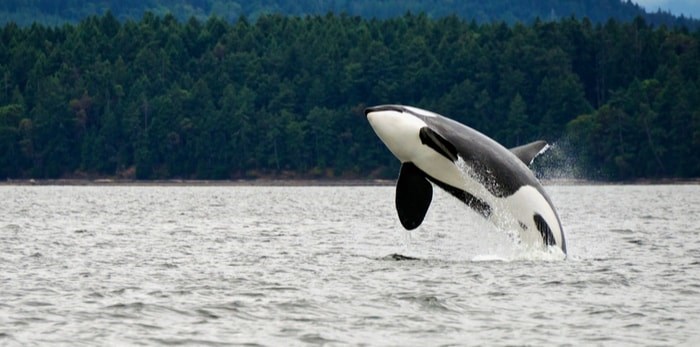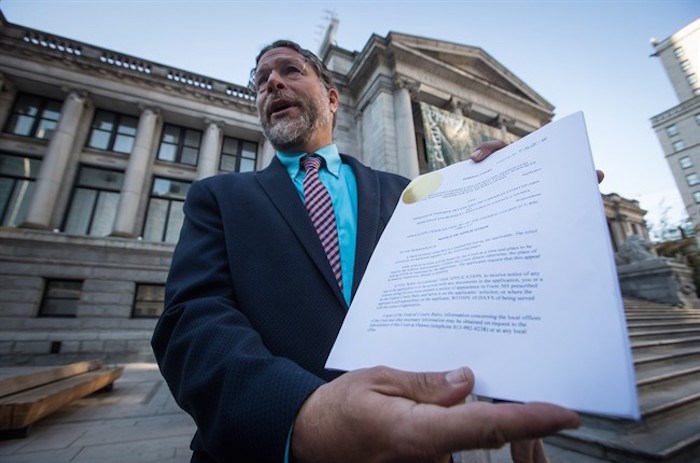VANCOUVER - A collection of conservation groups has teamed up to launch legal action aimed at protecting endangered southern resident killer whales.
The groups said Wednesday that the federal government failed to recommend an emergency order to protect the whales under the Species at Risk Act and they want a Federal Court to review that decision.
 Orca/Shutterstock
Orca/Shutterstock
Margot Venton, a lawyer and nature program director at Ecojustice, said they want the court to force the ministers to address existing imminent threats to the whales with an emergency order under the act.
The order is a legal tool that enables the government to fast-track protection for critically endangered populations like the southern residents, she said.
"The whales need a quieter ocean with more fish to eat, and they don't have that right now," she said. "The whales' situation is not improving, and in these dire circumstances the groups are left with no choice but to go to court to force the federal government to act."
There are just 75 southern resident whales remaining and their critical situation has been highlighted in the recent attempt by experts to save the life of a young, emaciated killer whale within the pod.
Also this summer, a female orca from the same pod pushed the body of her dead calf for more than two weeks when it died shortly after birth in July.
The other groups taking part in the legal action are the David Suzuki Foundation, the Georgia Strait Alliance, the Natural Resources Defense Council, the Raincoast Conservation Foundation and the World Wildlife Fund Canada.
In January, the same groups petitioned the federal government to use the emergency order power to protect the unique whales, Venton said.
 Jay Ritchlin, David Suzuki Foundation Director-General for Western Canada, holds a copy of a lawsuit conservation groups filed in federal court against Fisheries and Oceans Canada regarding the protection of southern resident killer whales, during a news conference in Vancouver, on Wednesday September 5, 2018. THE CANADIAN PRESS/Darryl Dyck
Jay Ritchlin, David Suzuki Foundation Director-General for Western Canada, holds a copy of a lawsuit conservation groups filed in federal court against Fisheries and Oceans Canada regarding the protection of southern resident killer whales, during a news conference in Vancouver, on Wednesday September 5, 2018. THE CANADIAN PRESS/Darryl Dyck
The federal government closed down several recreational and commercial chinook fisheries off the B.C. coast in May in an effort to free up more the fish for the whales. Chinook is a favoured meal for the resident killer whales that are found in coastal waters between B.C. and California.
The fisheries and environment ministers said then that a lack of prey for the whales was one of the critical factors affecting their recovery.
"The law is very clear," Venton said. "Once the ministers determine the threats are imminent they must recommend cabinet issue an emergency order. Legal protections already exist and unfortunately the ministers have failed to meet this responsibility"
Fisheries Minister Jonathan Wilkinson said in an emailed statement that the government is committed to protecting species at risk.
"Our government has taken unprecedented, sustained, ambitious action over the past two years to protect and recover the southern resident killer whale," he said.
Measures in the $170-million whales action plan include reducing chinook fisheries, funding wastewater treatment facilities, implementing vessel slowdowns and moving shipping lanes to reduce noise, and conducting additional research in contaminants and more, the statement said.
In response to requests from environmental and industry stakeholders the government has convened a working group to monitor implementation and to discuss additional measures that may be required, the minister said.
"We are committed to working collaboratively with all willing partners, including Indigenous communities to ensure that we effectively protect and recover this iconic species."
Michael Jasny, marine mammals director for the Natural Resources Defense Council said it's not that the government is doing nothing, but that it isn't acting in a way that fully addresses the threats that face the whales.
"And that's not just us saying that, that's not just science saying that, it's what the government itself acknowledged."
![]()


